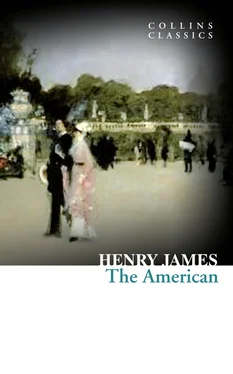The American
An enduring concern among internationally minded Americans is the stereotypical image of “the American” held by the rest of the world, especially Europe, perceived to be a disapproving cultural and social parent. Henry James was aware that the French writer Alexandre Dumas had portrayed an American as uncivilized and disreputable in his play L’Étrangère ( The Foreigner ) in 1876, so he wanted to redress this point of view in his novel The American (1877).
The central character of the novel is a wealthy American who travels to France in the aftermath of the American Civil War, to experience the historical and cultural depth of Europe. In essence, James was exploring the juxtaposition of a civilized American reacting to the social environment and traditions he encounters on his travels. Put simply, James portrayed a New World mind contrasted against those of the Old World. The fundamental point being that Americans were free from the complexities and preposterousness of etiquette that exist in high-society Europe, such etiquette a fragile structure that existed only because the components had remained unchanged for countless generations. To counteract the perception that Americans were unrefined in thoughts and behavior, James portrays his character as thoughtful and intellectually searching. However, he inevitably comes across as rather gauche and pretentious to European sensibilities because he is naïve of their ways. His attempts to learn to be cultivated and sophisticated are at odds with those around him who supposedly already are.
The story works because James manages to exploit the comic value from this humorous interplay, as the American struggles to deal with the bound behaviors of the Europeans, which makes them seem somewhere between eccentric and insane. The overriding insight is that behavioural “normality” is a subjective judgment, based on one’s level of familiarity with the world view of others. It is largely a case of never the twain shall meet, which is why people tend to simplify matters by inventing stereotypes. It becomes easier for the mind to comprehend if all members of a culture are superimposed by a single personality.
Of course, in life this occurs mutually, so that all cultures stereotype other cultures. The rub with James, however, is that America is perceived as an adolescent nation, so that it is faced with either delinquently ignoring those who still belong to its parent cultures or perpetually seeking approval from them. Interestingly, this idea still persists to some degree almost 150 years on: Americans are still stereotyped as loud and unsubtle by many Europeans, and Europeans are still stereotyped as staid and superior by many Americans.
CONTENTS
Title Page THE AMERICAN Henry James
History of Collins
Life & Times
Chapter 1
Chapter 2
Chapter 3
Chapter 4
Chapter 5
Chapter 6
Chapter 7
Chapter 8
Chapter 9
Chapter 10
Chapter 11
Chapter 12
Chapter 13
Chapter 14
Chapter 15
Chapter 16
Chapter 17
Chapter 18
Chapter 19
Chapter 20
Chapter 21
Chapter 22
Chapter 23
Chapter 24
Chapter 25
Chapter 26
Classic Literature: Words and Phrases adapted from the Collins English Dictionary
Copyright
About the Publisher
On a brilliant day in May, in the year 1868, a gentleman was reclining at his ease on the great circular divan which at that period occupied the centre of the Salon Carre, in the Museum of the Louvre. This commodious ottoman has since been removed, to the extreme regret of all weak-kneed lovers of the fine arts, but the gentleman in question had taken serene possession of its softest spot, and, with his head thrown back and his legs outstretched, was staring at Murillo’s beautiful moon-borne Madonna in profound enjoyment of his posture. He had removed his hat, and flung down beside him a little red guide-book and an opera-glass. The day was warm; he was heated with walking, and he repeatedly passed his handkerchief over his forehead, with a somewhat wearied gesture. And yet he was evidently not a man to whom fatigue was familiar; long, lean, and muscular, he suggested the sort of vigor that is commonly known as “toughness.” But his exertions on this particular day had been of an unwonted sort, and he had performed great physical feats which left him less jaded than his tranquil stroll through the Louvre. He had looked out all the pictures to which an asterisk was affixed in those formidable pages of fine print in his Badeker; his attention had been strained and his eyes dazzled, and he had sat down with an aesthetic headache. He had looked, moreover, not only at all the pictures, but at all the copies that were going forward around them, in the hands of those innumerable young women in irreproachable toilets who devote themselves, in France, to the propagation of masterpieces, and if the truth must be told, he had often admired the copy much more than the original. His physiognomy would have sufficiently indicated that he was a shrewd and capable fellow, and in truth he had often sat up all night over a bristling bundle of accounts, and heard the cock crow without a yawn. But Raphael and Titian and Rubens were a new kind of arithmetic, and they inspired our friend, for the first time in his life, with a vague self-mistrust.
An observer with anything of an eye for national types would have had no difficulty in determining the local origin of this undeveloped connoisseur, and indeed such an observer might have felt a certain humorous relish of the almost ideal completeness with which he filled out the national mould. The gentleman on the divan was a powerful specimen of an American. But he was not only a fine American; he was in the first place, physically, a fine man. He appeared to possess that kind of health and strength which, when found in perfection, are the most impressive—the physical capital which the owner does nothing to “keep up.” If he was a muscular Christian, it was quite without knowing it. If it was necessary to walk to a remote spot, he walked, but he had never known himself to “exercise.” He had no theory with regard to cold bathing or the use of Indian clubs; he was neither an oarsman, a rifleman, nor a fencer—he had never had time for these amusements—and he was quite unaware that the saddle is recommended for certain forms of indigestion. He was by inclination a temperate man; but he had supped the night before his visit to the Louvre at the Cafe Anglais—some one had told him it was an experience not to be omitted—and
he had slept none the less the sleep of the just. His usual attitude and carriage were of a rather relaxed and lounging kind, but when under a special inspiration, he straightened himself, he looked like a grenadier on parade. He never smoked. He had been assured—such things are said—that cigars were excellent for the health, and he was quite capable of believing it; but he knew as little about tobacco as about homeopathy. He had a very well-formed head, with a shapely, symmetrical balance of the frontal and the occipital development, and a good deal of straight, rather dry brown hair. His complexion was brown, and his nose had a bold well-marked arch. His eye was of a clear, cold gray, and save for a rather abundant mustache he was clean-shaved. He had the flat jaw and sinewy neck which are frequent in the American type; but the traces of national origin are a matter of expression even more than of feature, and it was in this respect that our friend’s countenance was supremely eloquent. The discriminating observer we have been supposing might, however, perfectly have measured its expressiveness, and yet have been at a loss to describe it. It had that typical vagueness which is not vacuity, that blankness which is not simplicity, that look of being committed to nothing in particular, of standing in an attitude of general hospitality to the chances of life, of being very much at one’s own disposal so characteristic of many American faces. It was our friend’s eye that chiefly told his story; an eye in which innocence and experience were singularly blended. It was full of contradictory suggestions, and though it was by no means the glowing orb of a hero of romance, you could find in it almost anything you looked for. Frigid and yet friendly, frank yet cautious, shrewd yet credulous, positive yet skeptical, confident yet shy, extremely intelligent and extremely good-humored, there was something vaguely defiant in its concessions, and something profoundly reassuring in its reserve. The cut of this gentleman’s mustache, with the two premature wrinkles in the cheek above it, and the fashion of his garments, in which an exposed shirt-front and a cerulean cravat played perhaps an obtrusive part, completed the conditions of his identity. We have approached him, perhaps, at a not especially favorable moment; he is by no means sitting for his portrait. But listless as he lounges there, rather baffled on the aesthetic question, and guilty of the damning fault (as we have lately discovered it to be) of confounding the merit of the artist with that of his work (for he admires the squinting Madonna of the young lady with the boyish coiffure, because he thinks the young lady herself uncommonly taking), he is a sufficiently promising acquaintance. Decision, salubrity, jocosity, prosperity, seem to hover within his call; he is evidently a practical man, but the idea in his case, has undefined and mysterious boundaries, which invite the imagination to bestir itself on his behalf.
Читать дальше












